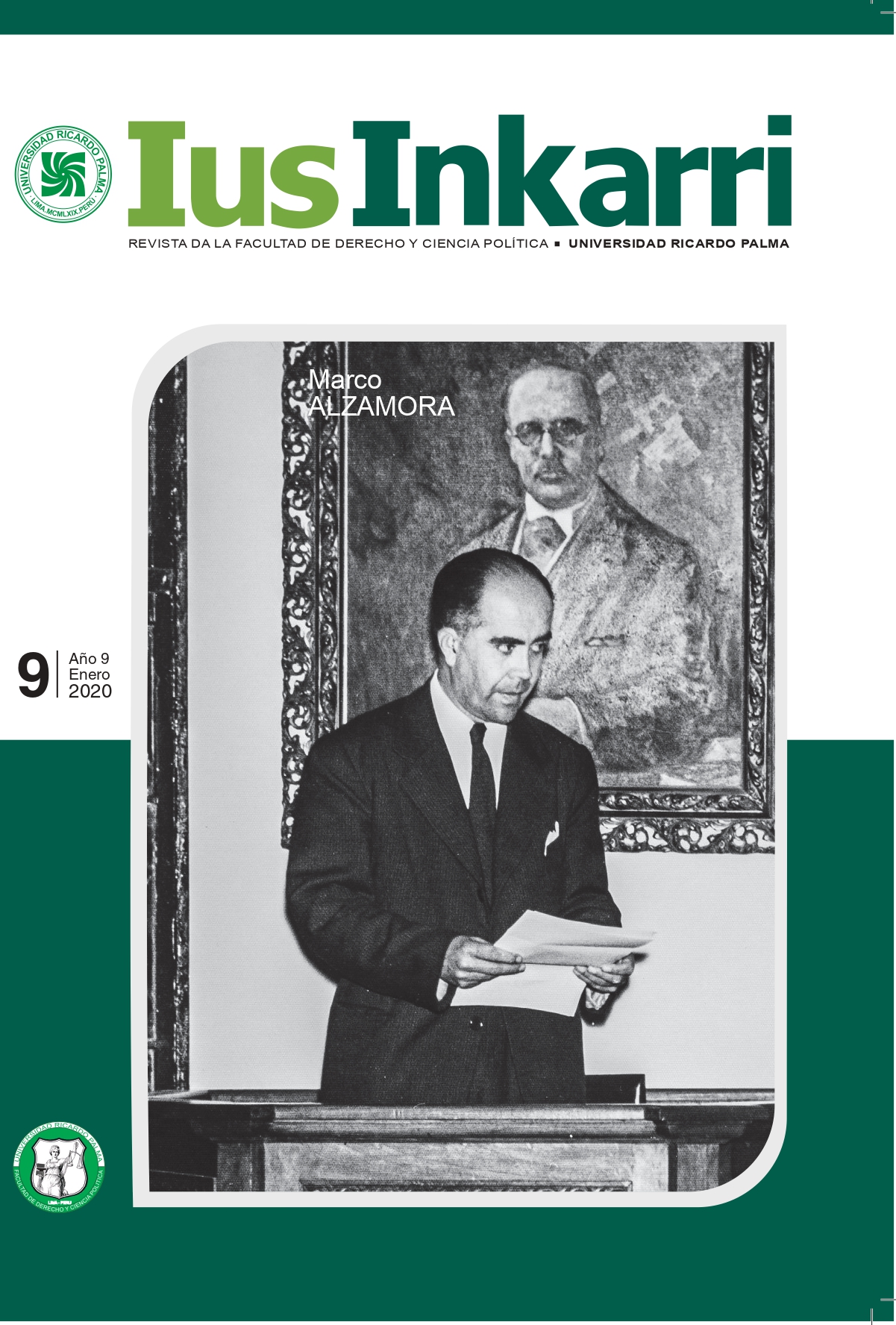Presumption of innocence in the civil sphere? An analysis of the proposals of Eduardo da Fonseca and J. Harvie Wilkinson III
DOI:
https://doi.org/10.31381/iusinkarri.v9n9.3691Keywords:
presumption of innocence, standards of proof, burden of proof, penalty theory, presumption of civil innocenceAbstract
This paper examines the presumption of innocence idea in the civil sphere developed by Eduardo da Fonseca and J. Harvie Wilkinson III. For this objective, it analyzes the assumptions of both proposals. They are elaborated on the basis of the relationship between the conception of punishment and the moral and political criteria associated with the determination of standards of proof. In this sense, it reveals two problematic aspects common to both conceptions consisting of: first, the implicit adoption of a nominalist perspective on punishment, and second, the absence of a discussion of the moral and political criteria that justify both the exclusivity of the presumption of criminal innocence and its expansion to the civil sphere. It is concluded that the answer to the question of the possibility of a presumption of civil innocence requires metaethical and political philosophy notions that both proposals fail to develop.
Downloads
References
Beisner, J. (2010). Discovering a Better Way: The Need for Effective Civil Litigation Reform. Duke Law Journal, 60(3), 547-596.
Blackstone, W. (1979) [1769]. Commentaries on the Laws of England (vol. 4). The University of Chicago Press.
Bystranowski, P. (2017). Retributivism, Consequentialism, and the Risk of Punishing the Innocent: The Troublesome Case of Proxy Crimes. Diametros, (53), 26-49.
Cavani, R. (2018). Prueba de oficio y prohibición de reemplazar cargas probatorias. Gaceta Civil & Procesal Civil, (65), 19-30.
Costa, E. J. (2017). Presunção de inocência civil: algunas reflexões no contexto brasileiro. Revista Brasileira de Direito Processual, 25(100), 129-144.
Cumiz, J. y Dei Vecchi, D. (2019). Estándares de prueba y ponderación de derechos en la Corte Penal Internacional. InDret. Revista para el Análisis del Derecho, (2).
Epps, D. (2016). One Last Word on the Blackstone Principle. Virginia Law Review Online, 102, 34-47.
Ferrer, J. (2010). Una concepción minimalista y garantista de la presunción de inocencia. Revista de la Maestría en Derecho Procesal, 4(1). https://revistas.pucp.edu.pe/index.php/derechoprocesal/article/view/2393
Ferrer, J. (2019). La carga dinámica de la prueba. Entre la confusión y lo innecesario. En J. Nieva Fenoll, J. Ferrer Beltrán y L. J. Giannini (ed.), Contra la carga de la prueba (pp. 53-87). Marcial Pons.
Gascón, M. (2019). Sobre la posibilidad de formular estándares de prueba objetivos. En C. Vázquez (ed.), Hechos y razonamiento probatorio (pp. 67-80). Zela.
Hart, H. L. A. (2008). Punishment and Responsibility. Essays in the Philosophy of Law. Oxford University Press.
Kaplow, L. (2012). Burden of Proof. The Yale Law Journal, 121(4), 738-859.
Kindhäuser, U. (2011). Personalidad, culpabilidad y retribución. De la legitimación y fundamentación ético-jurídica de la pena criminal. En Kindhäuser, U. y Mañalich, J. P., Pena y culpabilidad en el Estado democrático de derecho (pp. 3-28). B de F.
Laudan, L. (2013). Convergence or Divergence in the Evolution of (Criminal) Rights? A Case Study of the Multiple Incoherencies of the Presumption of Innocence. U of Texas Law, Public Law Research Paper, (400).
Laudan, L. y Saunders, H. (2009). Re-Thinking the Criminal Standard of Proof: Seeking Consensus About the Utilities of Trial Outcomes. International Commentary on Evidence, 7(2). https://doi.org/10.2202/1554-4567.1099
Laufer, W. (2006). Corporate Bodies and Guilty Minds. The Failure of Corporate Criminal Liability. The University of Chicago Press.
Mañalich, J. P. (2011). Retribucionismo expresivo. Acerca de la función comunicativa de la pena. En Kindhäuser, U. y Mañalich, J. P., Pena y culpabilidad en el Estado democrático de derecho (pp. 29-65). B de F.
Mañalich, J. P. (2018). El principalismo político-criminal como fetiche. Revista de Estudios de la Justicia, (29), 59-71.
Moore, M. S. (1997). Placing Blame: A General Theory of the Criminal Law. Oxford University Press.
Nieva Fenoll, J. (2013). La duda en el proceso penal. Marcial Pons.
Nieva Fenoll, J. (2016). La razón de ser de la presunción de inocencia. InDret. Revista para el Análisis del Derecho, (1).
Picinali, F. (2018). Can the Reasonable Doubt Standard be Justified? A Reconstructed Dialogue. Canadian Journal of Law & Jurisprudence, 31(2), 365-402.
Puppe, I. (2014). El derecho penal como ciencia. Método, teoría del delito, tipicidad y justificación. B de F.
Reynaldi, R. C. (2016, 25 de diciembre). Estándar de prueba o convicción judicial. Una crítica a la teoría de la probabilidad preponderante. LP. Pasión por el Derecho. https://lpderecho.pe/estandar-prueba-conviccion-judicial-una-critica-lateoria-la-probabilidad-preponderante/
Río Labarthe, G. del (2010). La acción civil en el Nuevo Proceso Penal. Derecho PUCP, (65), 221-233. https://doi.org/10.18800/derechopucp.201002.010
Stumer, A. (2018). La presunción de inocencia. Perspectiva desde el derecho probatorio y los derechos humanos. Marcial Pons.
Ulväng, M. (2013). Presumption of Innocence Versus a Principle of Fairness. Netherlands Journal of Legal Philosophy, 42(3), 205-224.
Walen, A. (2015). Proof Beyond a Reasonable Doubt: A Balanced Retributive Account. Louisiana Law Review, 76(2), 355-446.
Wilkinson, H. (2018). The Presumption of Civil Innocence. Virginia Law Review, 104(4), 589-655.
Downloads
Published
How to Cite
Issue
Section
License
Copyright (c) 2020 Diego Alarcón Donayre

This work is licensed under a Creative Commons Attribution 4.0 International License.













